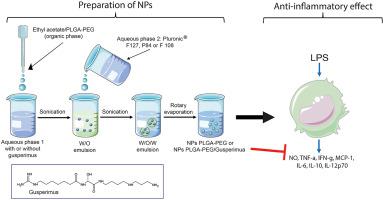Journal of Drug Delivery Science and Technology ( IF 4.5 ) Pub Date : 2022-10-13 , DOI: 10.1016/j.jddst.2022.103889 Juliana Palacio , Yuliana Monsalve , Janny A. Villa-Pulgarin , Katherin V. Contreras Ramirez , Carlos E. Navarro Chica , Ligia Sierra , Betty L. López

|
Gusperimus is an immunosuppressive drug used to control autoimmune diseases and prevent rejection in organ transplantation. It has a high-water solubility leading to poor intracellular permeability, rapid enzymatic degradation, and clearance. To achieve controlled delivery of Gusperimus and protect its stability and bioactivity, encapsulation in PLGA-PEG nanoparticles was studied. The effect on nanoparticles properties of the surfactant type (Pluronic® F127, P84, and F108) and polymer concentration (0.2% and 1.7% w/v) used for their preparation was evaluated. The system prepared with 1.7% w/v PLGA-PEG and 1% w/v Pluronic® F127 was selected to encapsulate Gusperimus since it provides the smallest particle size and higher colloidal stability. The nanoparticles showed an encapsulation efficiency and a load capacity of 82.8% and 1.48%, respectively. In vitro release showed a total release of 19% after 36 h. PLGA-PEG/Gusperimus nanoparticles were evaluated in vitro to determine their cytotoxicity, cellular uptake, and anti-inflammatory activity in mouse macrophages. They showed no-cytotoxicity for J774A.1 macrophages with 100% viability, for concentrations up to 50 μg/mL and higher than 75% for 400.0 μg/mL. PLGA-PEG/Gusperimus nanoparticles were taken up by macrophages and exerted anti-inflammatory effects as it is indicated by nitric oxide reduction and cytokine suppression in LPS-induced inflammatory macrophages model.
中文翻译:

PLGA-PEG/Gusperimus纳米粒作为控释抗炎药的制备与评价
Gusperimus 是一种免疫抑制药物,用于控制自身免疫性疾病和防止器官移植排斥反应。它具有高水溶性,导致细胞内渗透性差、酶促降解和清除快。为了实现 Gusperimus 的受控递送并保护其稳定性和生物活性,研究了在 PLGA-PEG 纳米颗粒中的包封。评估了用于制备它们的表面活性剂类型(Pluronic® F127、P84 和 F108)和聚合物浓度(0.2% 和 1.7% w/v)对纳米粒子性能的影响。选择用 1.7% w/v PLGA-PEG 和 1% w/v Pluronic® F127 制备的系统来封装 Gusperimus,因为它提供了最小的粒径和更高的胶体稳定性。纳米粒子的封装效率和负载能力分别为 82.8% 和 1.48%。体外释放显示 36 小时后总释放率为 19%。PLGA-PEG/Gusperimus 纳米颗粒在体外进行了评估,以确定它们在小鼠巨噬细胞中的细胞毒性、细胞摄取和抗炎活性。它们对 J774A.1 巨噬细胞显示无细胞毒性,具有 100% 的活力,浓度高达 50 μg/mL 和高于 75% 的 400.0 μg/mL。PLGA-PEG/Gusperimus 纳米颗粒被巨噬细胞吸收并发挥抗炎作用,正如 LPS 诱导的炎性巨噬细胞模型中一氧化氮减少和细胞因子抑制所表明的那样。






























 京公网安备 11010802027423号
京公网安备 11010802027423号